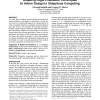69 search results - page 3 / 14 » A General Proximity Privacy Principle |
SOUPS
2010
ACM
13 years 9 months ago
2010
ACM
The principle of least privilege requires that users and their programs be granted the most restrictive set of privileges possible to perform required tasks in order to limit the ...
SIGMOD
2007
ACM
14 years 5 months ago
2007
ACM
The previous literature of privacy preserving data publication has focused on performing "one-time" releases. Specifically, none of the existing solutions supports re-pu...
CHI
2005
ACM
14 years 5 months ago
2005
ACM
We argue that an analytic proportionality assessment balancing usefulness and burden on individual or group privacy must be conducted throughout the design process to create accep...
SIGMOD
2009
ACM
14 years 5 months ago
2009
ACM
In this paper we present a method for reasoning about privacy using the concepts of exchangeability and deFinetti's theorem. We illustrate the usefulness of this technique by...
POPL
2012
ACM
12 years 28 days ago
2012
ACM
Differential privacy is a notion of confidentiality that protects the privacy of individuals while allowing useful computations on their private data. Deriving differential priva...

